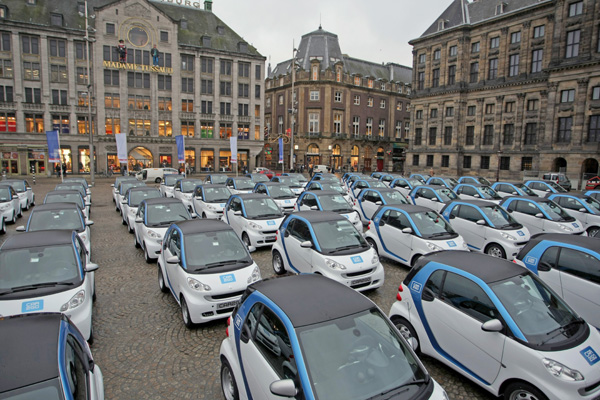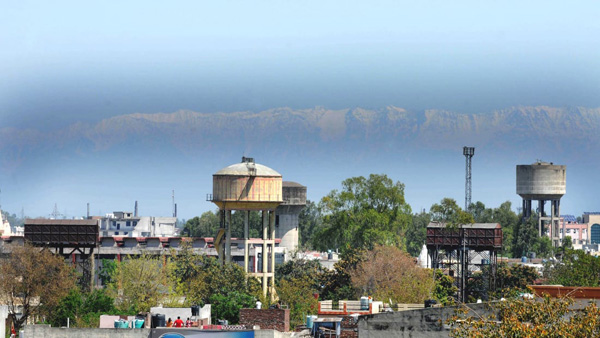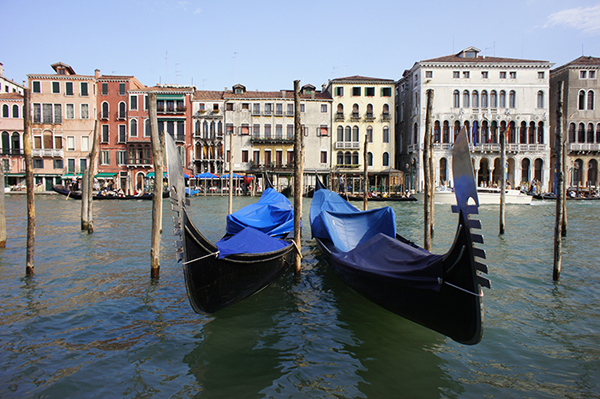코로나19, 인류에게 친자연이라는 교훈을 주다

The novel coronavirus, which causes COVID-19, has created an ongoing pandemic that has been affecting almost all of us in a variety of ways. It has been reported in 187 countries and territories around the world, leaving hundreds of thousands people unemployed and stuck in quarantines for an uncertain period of time. While some countries are handling it well, others have not been so lucky. At the beginning of April 2020, approximately 3.9 billion people worldwide were under some kind of lockdown amid concerns of COVID-19’s spread. One does not have to be an economist to imagine what kind of economic recessions countries will face based on the recent figures.
Although economies are partially shut down, consequently limiting industrial manufacturing, production, and touristic transportation, some environmentally positive news has been circulating on the internet and in the media. Among them are a drop in carbon dioxide emissions due to limited transportation use, the clearing of canal waters in Venice, the Himalayan peaks in India becoming visible, the healing of the ozone layer, and more. It seems like nature is recovering and even thriving, whereas humanity is forced to remain indoors. It is hard to see a silver lining in situations like the current pandemic, but the fact that nature is regenerating itself is indeed a silver lining.
The turquoise waters of Venice, replenished with colorful wildlife in a currently tourist-free city, and the majestic Himalayan peaks are sights worth seeing, without a doubt! But for how long will they remain in this condition? The day will come when the world will resume its usual busy life and the never-ending race to increase GDP by producing more and more. In the era of slogans like “the consumer is always right” and liberal economic concepts such as “the more a country produces, the richer it is,” there is a high probability that we will quickly go back to the way we were. And the way we were was not a sustainable normal. If it were, we would not face ozone-layer depletion, widespread pollution, freshwater withdrawals, land conversion, increasing magnitudes of natural disasters, and rapidly disappearing species in flora and fauna. Moreover, human activities like deforestation, the booming meat business, and animal hunting increase the risk that viruses originating in the animal population might jump from animals to humans as a result of closer contacts in the future.
Therefore, I would like to share with you a couple of notable policies implemented by different countries in order to prevent the looming climate crisis. One of them is in the process of partial implementation, while the other is in the stage of active realization. The first agenda is called “Sustainable Amsterdam,” supervised by the administration of Amsterdam. “Sustainable Amsterdam” is a good example of relevant responses to climate issues that have been stressed by scientists over and over. Briefly, it is a grandiose plan to make Amsterdam electric, and by that I mean to shift all types of vehicles from diesel-based to electric engines by offering companies low-interest-rate loans. Recently, the administration of Amsterdam has announced that it is preparing to transition from a classical liberal economy to a “doughnut economy,” which is a more eco-centered type of economy.

The second major initiative is an ongoing “10 Billion Trees Initiative” by the Pakistani government. This green agenda was initially started to deal with frequent floods, prevent deforestation in the long term, and contribute to balancing out the climate of the world. Since the outbreak of COVID-19, Pakistan has been under lockdown. To help out its unemployed laborers in this time of crisis, Pakistan partially reactivated the “10 Billion Trees Initiative” and hired thousands of workers to carry on with the agenda while wearing masks and following rules of social distancing. It is evident that the government is planting the trees mostly in rural, low-income areas so these people will benefit from the project the most. It is impressive how the government of Pakistan is managing to keep its people safe and employed, while contributing to the recovery of our planet.
The last, but not least, green initiative is the International Climate and Environment Center (ICEC) funded by our very own Gwangju Metropolitan City government. The organization plans to change Gwangju into a “low-carbon green city” via regular policy research and the “green education” of its citizens. The center consists of a triumvirate of Management and Cooperation, Policy and Research, and Education Project teams. All three teams work hard to collect data, identify environmental issues, and respond accordingly. The ICEC leads field activities such as the adaptation of cities to climate change; research on energy, air, and climate quality; and cooperating with citizens to create a balanced, environmentally friendly green city.
Building an economically developed city without compromising its environment is a key goal of the center. At the latest ICEC “Plastic Waste Management” workshop, a set of new innovative solutions was presented to the public in 2019. South Korea will rely on its advanced technological potential to address expected increases in plastic waste production. According to the statistics provided by Kim Young-yul, the representative director of BASF Company Ltd. (a participant in the workshop), by 2050 there could be more plastic than fish in the ocean. As one of the possible solutions, he mentions the “circular economy.” In contrast to a “linear economy,” which mainly focuses on “take-make-waste,” a “circular economy” offers to use and then reuse, and maybe reuse again if possible.
As Harvard scientist Avi Loeb concluded in his interview with the BBC, “The human species will likely destroy itself long before the sun kills everyone on earth.” The ongoing pandemic is like a splash of icy water on the face of humankind. But if we could continue to see a significant drop in the percentage of greenhouse gas emissions in countries that most significantly pollute, like China, India, the USA, and others, improvements in air and water quality like the world has seen over just the last few months are some of the benefits humanity can expect to reap. There is hope, but there are no excuses left. It is no longer “us” versus “them.” COVID-19 evidently does not have any borders, and neither does climate change.
A South American proverb says, “We did not inherit the earth from our ancestors, we borrowed it from our children.” And unless you are Elon Musk planning to take off to Mars or somewhere farther in the near future, you should always keep in mind that you are part of a global society that is responsible for taking a stand and leading humanity towards a greener future.
Written by Cami Ismanova
The Author
Cami Ismanova is a student at Chonnam National University majoring in economics. She enjoys listening to jazz, reading popular science, writing, and traveling around (when it is safe...). Cami wishes everyone to stay healthy. Instagram: @camidisman
*This article was originally published in Gwangju News June 2020 issue.
Gwangju News is the first public English monthly magazine in Korea, first published in 2001 by Gwangju International Center. Each monthly issue covers local and regional issues, with a focus on the stories and activities of the international residents and communities. Read our magazine online at: www.gwangjunewsgic.com
-원문 해석-

코로나19의 원인이 되는 신종 코로나 바이러스는 다양한 방면에서 우리 모두에게 영향을 끼치는 지속적인 팬데믹을 발생시켰다. 코로나19는 187개국에서 발병 보고 되었고, 수십만 명의 사람들이 실직을 하고 불확실한 기간 동안 격리를 하게 되었다. 이 사태를 잘 대응해 나가는 나라도 있는 반면, 그렇지 못한 나라들도 많다. 2020년 4월 초, 전세계 약 39억 명의 사람들이 코로나19의 확산 우려 속에 일종의 봉쇄를 당했다. 최근 수치를 살펴보면 경제학자가 아니더라도 각 국가들이 어떤 경기 침체에 직면할지 상상할 수 있을 것이다.
비록 경제가 부분적으로 정지되어 제조업과 생산, 관광 교통이 제한되었지만, 환경적으로 긍정적인 뉴스도 인터넷과 미디어에서 볼 수 있다. 그 중에는 제한된 교통 이용으로 인한 이산화탄소 배출량의 감소, 베니스 운하의 정화, 선명하게 보이는 인도 히말라야 산맥들의 산봉우리, 그리고 오존층의 회복 등등이 있다. 강제로 실내에서만 지내야하는 인류와 달리 자연은 회복되고 있을 뿐만 아니라 번성해 지는 것처럼 보인다. 현재의 팬데믹과 같은 상황에서 희망을 찾기가 쉽지 않지만, 자연이 스스로 재생되고 있는 것이야말로 희망이라고 볼 수 있다.
현재 관광객이 없는 베니스의 다채로운 야생과 아름다운 청록색 물, 그리고 장엄한 히말라야 산맥의 산봉우리들은 의심할 여지 없이 볼만한 가치가 있는 곳들이다. 하지만 이 관광지들이 언제까지 이러한 상태로 남아 있을까? 세계는 기존의 바쁜 상태로 돌아가 더 많은 것을 생산함으로써 GDP를 증가시키는 끝없는 경쟁을 재개할 날이 올 것이다. “소비자는 항상 옳다”라는 말이나 “생산을 많이 하는 나라일수록 풍요롭다”는 식의 자유주의적 경제개념의 시대에는 우리의 기존 생활 방식으로 빠르게 돌아갈 가능성이 높다. 그리고 우리의 기존 생활 방식은 지속 가능하지 않았다. 만약 지속이 가능했더라면, 우리는 오존층 파괴, 광범위한 오염, 물 부족, 토지 개발, 자연 재해의 증가, 그리고 빠르게 사라지는 동식물 종과 같은 문제에 직면하지 않았을 것이다. 게다가, 삼림 벌채, 육류 산업, 동물 사냥과 같은 인간 활동은 장래에는 인간과 동물의 더욱 밀접한 접촉의 결과로 동물 개체군에서 유래한 바이러스들이 인간에게 전염될 위험을 증가시킨다.
그러므로 다가오는 기후 위기를 방지하게 위해 다양한 국가에서 실행하는 주목할 만한 정책들에 대해 이야기 하고 싶다. 이 중 하나는 부분실행 단계에 있는 반면, 다른 하나는 활발한 실현 단계에 있다. 첫 번째 의제는 “지속 가능한 암스테르담”이라고 불리며, 암스테르담 정부의 감독 아래 진행된다. “지속 가능한 암스테르담”은 과학자들이 수 없이 강조해 온 기후 문제에 대한 적절한 반응의 좋은 예가 된다. 간단히 말하자면 암스테르담을 전기 도시로 만들 거창한 계획이며, 기업에 저리 융자를 해주어 모든 종류의 차량을 디젤에서 전기 엔진으로 바꿀 예정이다. 최근 암스테르담 정부는 고전적인 자유주의 경제에서 보다 환경중심적인 경제의 형태인 “도넛 경제”로의 전환을 준비하고 있다고 발표했다.
두 번째 주요 계획은 파키스탄 정부에서 진행 중인 “나무 100억 그루 계획”이다. 이 친환경적 의제는 빈번한 홍수에 대처하고, 장기적으로 삼림 벌채를 방지하며, 세계의 기후를 균형있게 유지하는 데 기여하기 위해 시작되었다. 코로나19 창궐 이후, 파키스탄은 봉쇄되었다. 파키스탄은 이러한 위기의 상황 속에서 발생한 실업자들을 돕기 위해 노동자 수천명을 고용해 마스크 쓰기와 사회적 거리두기 규정 등을 준수하며 “나무 100억 그루 계획”을 일부 재가동했다. 정부가 주로 농촌과 저소득층 지역에 나무를 많이 심고 있는 것은 그러한 지역의 사람들에게 큰 혜택을 주기 위한 것이 분명하다. 파키스탄 정부가 우리 지구의 회복에 기여를 하면서도 국민들 안전하게 보호하고 실업자를 줄이려고 노력하는 점이 인상적이다.

세번째 친환경적 발안은 다름이 아닌 우리 광주광역시가 후원하는 국제기후환경센터(ICEC)이다. 국제기후환경센터는 정기적인 정책 연구와 시민들의 ‘녹색 교육’을 통해 광주를 ‘저탄소 녹색 도시’로 변화시킬 계획이다. 이 센터는 운영협력팀과 정책연구팀, 그리고 교육프로젝트팀까지 총 3개의 팀으로 구성된다. 세 팀은 모두 데이터 수집, 환경 문제 파악, 그리고 그에 대한 대응책 마련을 위해 노력하고 있다. ICEC는 기후 변화에 대한 도시의 적응, 에너지, 공기, 기후 질에 대한 연구, 그리고 균형있고 친환경적인 녹색 도시를 만들기 위한 시민들과의 협력과 같은 현장 활동을 이끈다.
환경을 훼손하지 않고 경제적으로 발전된 도시를 건설하는 것이 이 센터의 핵심 목표이다. 2019년에 열린 가장 최근 ICEC “플라스틱 폐기물 관리” 워크숍에서는 새롭고 혁신적인 해결책들이 제시되었다. 대한민국은 발전된 기술을 이용해 예상되는 플라스틱 폐기물 증가를 해결할 것이다. BASF 컴퍼니의 대표이사인 김영율씨(워크숍 참여자)가 제시한 통계에 의하면, 2050년이면 바다에는 물고기보다 플라스틱이 많을 수도 있다. 가능한 해결책 중 하나로 그는 “순환 경제”를 언급한다. 소위 “자원 개발-생산-소비(take-make-waste)”에 초점을 둔 “직선형 경제”와 다르게 “순환 경제”는 사용 후 재사용하고, 가능하면 또 재사용할 것을 제안한다.
하버드 대학교 과학자인 아비 리오브(Avi Loeb)는 BBC와의 인터뷰 중 “태양이 지구에 사는 우리 모두를 죽이기 전에 인류가 먼저 스스로를 멸망시킬 확률이 더 높다”는 결론 지었다. 이 지속되는 팬데믹은 마치 인류의 얼굴에 얼음물을 뿌리는 것과 같다. 하지만 중국, 인도, 미국 등 오염도가 높은 나라들의 온실가스 배출 비율이 계속 감소할 수 있다면, 지난 몇 달 동안 세계가 경험한 대기질과 수질의 개선은 인류가 기대할 수 있는 혜택들 중 일부일 것이다. 희망은 있지만, 더 이상 핑계거리는 없다. 더 이상 “우리” 대 “그들”이 아니다. 코로나19에게는 국경이 없고 기후 변화도 마찬가지이다.
남아메리카에는 “우리는 조상으로부터 지구를 물려받은 것이 아니라 우리의 자식들에게서 지구를 빌렸다”라는 속담이 있다. 가까운 미래에 화성이나 더 먼 곳으로 떠날 계획이 있는 엘론 머스크가 아니라면, 항상 우리는 더 푸른 미래를 향해 인류를 이끄는 책임이 있는 글로벌 사회의 일부라는 것을 명심해야한다.
글·사진=카미 이즈마노바(Cami Ismanova)
번역=이유니 (광주국제교류센터 자원활동가)
글쓴이
카미 이즈마노바는 전남대학교에서 경제학을 전공하는 학생이다. 그녀는 재즈 음악을 즐겨 들으며, 인기있는 과학 이슈에 대해 읽기, 글쓰기, 그리고 (안전할 때) 여행하는 것을 좋아한다. 카미는 모두가 건강하기를 기원한다.
인스타그램: @camidisman
*이 글은 광주뉴스 2020년 6월호에 실린 내용입니다.
광주뉴스는 광주국제교류센터가 2001년에 처음 발행한 대한민국 최초의 영문 대중월간지입니다. 매월 발행되는 각 호에는 지역에 거주하는 외국인과 지역민의 활동과 지역사회의 이야기 및 이슈를 다루고 있습니다. 온라인에서도 잡지를 볼 수 있습니다. (www.gwangjunewsgic.com)

